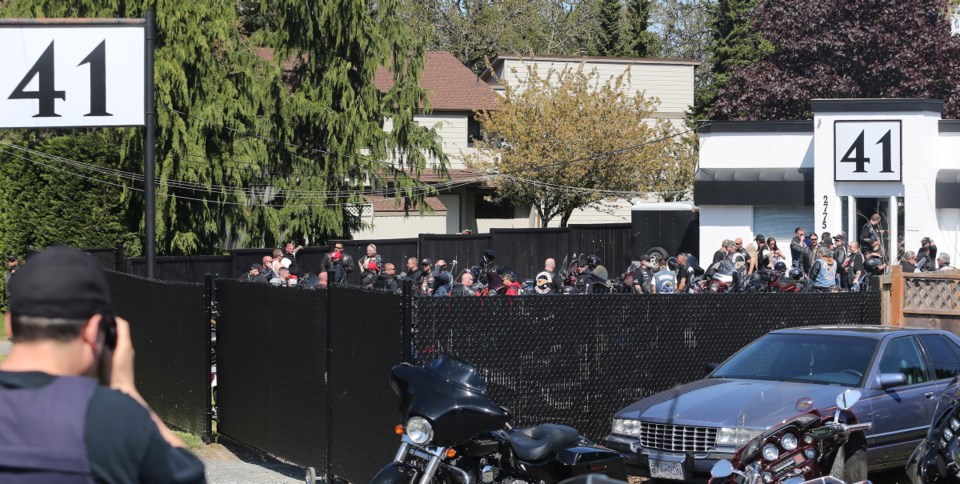Between 100 and 150 motorcyclists from the Hells Angels and other clubs rolled into Langford on Saturday for the opening of what police are calling Greater Victoria’s first biker clubhouse.
The bikers were greeted with a heavy police presence, including West Shore RCMP, the Integrated Road Safety Unit, and regional, provincial and federal units dedicated to outlaw motorcycle gangs.
The clubhouse is believed to belong to the Devils Army. According to the Combined Forces Special Enforcement Unit, B.C.’s anti-gang unit, the group is a Hells Angels “puppet club.”
RCMP Staff Sgt. Andrew Isles of the Island District management team said the opening of the new clubhouse is significant.
“We’re always interested in who is in our communities as far as outlaw motorcycle gangs go,” Isles said.
“There are some new faces here we’re seeing, and we’re also taking stock of who’s here and who’s invited.”
RCMP escorted about 90 bikers to Langford from Campbell River, Nanaimo and the Lower Mainland. Several traffic violation tickets were issued.
Aside from the opening of the clubhouse, the bikers were also gathering for the Zeke Run. The spring ride is held in memory of Edward (Zeke) Mickle, a Nanaimo Hells Angels member who hasn’t been seen since May 1993. In the past, as many as 400 bikers from around B.C. have taken part in the round-trip ride from Nanaimo to Victoria.
Among the badges represented Saturday were Hells Angels, Devils Army, Old School Originals and Falcons Motorcycle Club. Large signs on the clubhouse property display the number 41, which one officer said represents the fourth and first letters of the alphabet — DA, for Devils Army.
A biker manning the entrance of the clubhouse gate at 2775 Spencer Rd. was courteous and said no one would be commenting on behalf of riders.
Isles, based in Nanaimo, said there’s nothing to indicate the public has anything to be worried about.
“This is a new club to the community,” he said. “We don’t know enough about them yet, so we’re going to continue to monitor, watch and take action accordingly.”
The Devils Army was first reported on in 2009 by Vancouver Sun reporter Kim Bolan. Her source, Insp. Gary Shinkaruk of the RCMP’s Outlaw Motorcycle Gang Unit, said it was headed by Hells Angels associate Ricky Alexander of the Lower Mainland.
“The puppet gangs — so-called because the Hells Angels are thought to pull their strings — create a much larger network that HA members can use criminally, while insulating themselves from law enforcement,” wrote Bolan, based on police interviews.
Hells Angels spokesman Rick Ciarniello told the Times Colonist otherwise.
“There is no direct relationship between the two groups,” Ciarniello wrote in response to queries about the new clubhouse.
“This story has nothing to do with Hells Angels — no matter what you are told by law enforcement.”
Sgt. Lindsey Houghton, spokesman for the CFSEU-BC, said the Langford clubhouse is the Devils Army’s first outside Campbell River.
He said Hells Angels’ puppet clubs “typically do all the menial and dirty work for the HA” — working security, arranging food and beverage for events, as well as funnelling money to the group.
Rob Gordon, a Simon Fraser University criminologist, said ties between puppet clubs and larger outlaw motorcycle clubs can vary in strength.
The puppet clubs began appearing after some successful police operations, especially in the Fraser Valley, created a vacuum in the drug trade, he said.
“Once the police started to knock out Hells Angels, these other groups sprung up,” Gordon said.
The puppet groups aren’t necessarily initiated by Hells Angels, he said, but they obtain permission from Hells Angels to operate. There are about half a dozen puppet clubs in B.C., he said.
“They’re relatively ill-disciplined. The Hells Angels kept everyone in line for years — that’s why there was less violence around the illegal drug trade,” he said.
The links may be weaker than the term “puppet club” implies, Gordon said.
“I don’t think Hells Angels mastermind what they do.”



